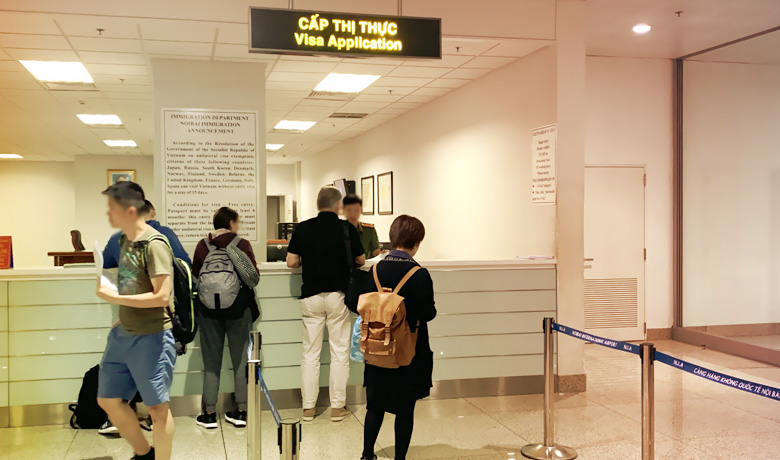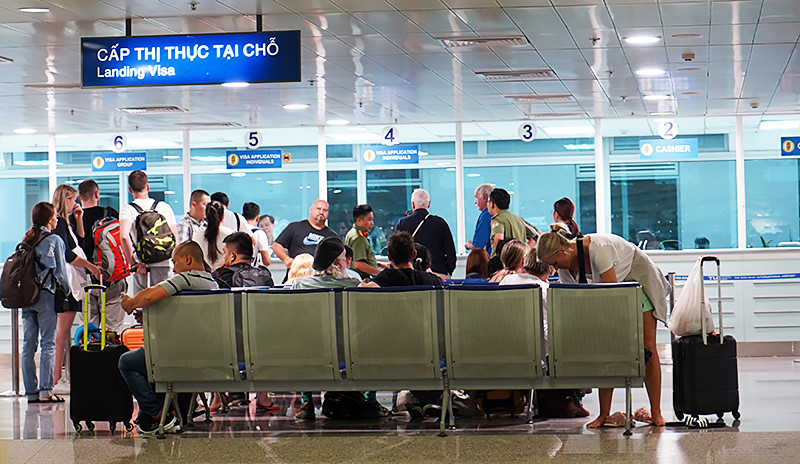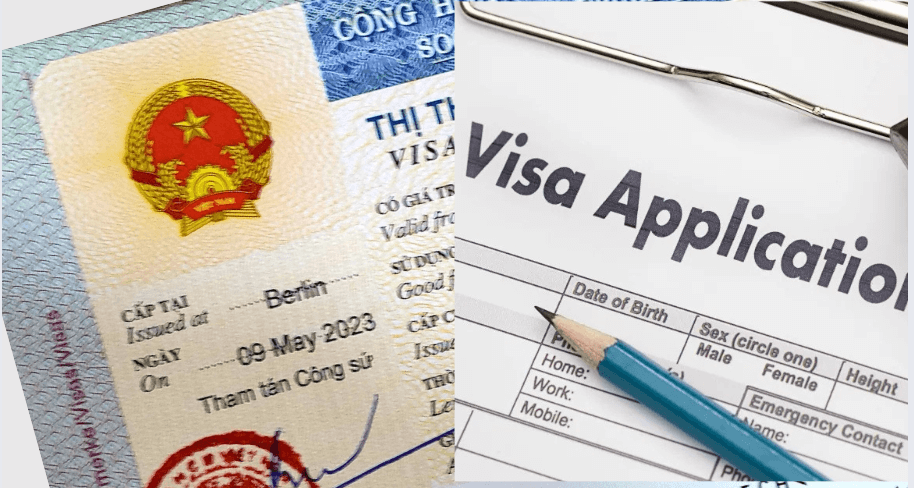Are you a Taiwanese citizen planning to travel to Vietnam in 2025? This comprehensive guide covers the 2025 Update: Vietnam Visa and Fast-Track Guide for Taiwanese Citizens, ensuring that you have all the information needed to navigate the visa process seamlessly.
Vietnam Visa and Fast-Track for Taiwanese in 2025: Key Updates

As the world continues to evolve, so do the rules and regulations surrounding travel. For Taiwanese citizens, understanding the latest updates regarding visas for Vietnam is crucial for a smooth travel experience. As of 2025, various changes have been implemented that may affect how you obtain your visa and enter the country.
With an increase in tourism between Taiwan and Vietnam, the Vietnamese government has made efforts to streamline processes for travelers. These changes are not just about convenience; they also reflect a growing recognition of the importance of tourism to both economies.
Understanding these updates will help you make informed decisions about your travel plans. Here’s what you need to know:
New Visa Types Introduced
In 2025, Vietnam introduced new visa categories tailored for different types of visitors, including business travelers, tourists, and expatriates.
These new types include:
- Business E-Visa: Designed specifically for those traveling for work-related reasons.
- Tourist E-Visa: Allows for a single entry and is valid for a short stay, ideal for leisure travelers.
- Long-Stay Visas: For those looking to stay longer than the standard duration, suitable for expats or long-term visitors.
Each visa type has specific eligibility requirements and processing times, making it essential for travelers to ascertain which one applies to their situation.
Enhanced Processing Times
One of the major updates for Taiwanese travelers is the reduction in visa processing times. In some instances, visas can now be issued within 24 hours if applied for through fast-track services.
This change facilitates last-minute travel plans and accommodates spontaneous trips, which resonate well with increasingly dynamic travel demands.
Online Application System
The introduction of an online application system simplifies the visa acquisition process significantly. Travelers can apply from the comfort of their homes, reducing the need for in-person visits to consulates or embassies.
This digital advancement allows for quicker verification and approval processes, eliminating many hurdles faced by previous applicants.
2025 Visa Requirements for Taiwanese Citizens Traveling to Vietnam

When preparing for your trip to Vietnam, familiarizing yourself with the updated visa requirements is a foundational step. The following sections delve into these requirements, providing you with clear insights.
Mandatory Documents for Visa Application
To successfully apply for a visa to Vietnam, Taiwanese citizens must gather certain mandatory documents.
These typically include:
- A valid passport with at least six months left until expiration.
- A recent passport-sized photograph.
- Proof of travel arrangements, including flight bookings.
- Payment for the visa fee, typically done online.
Having these documents ready and organized will expedite the application process and minimize delays.
Health and Safety Regulations
Health regulations concerning vaccinations and health insurance have become increasingly important over time.
For 2025, travelers from Taiwan are advised to ensure they are up-to-date on vaccinations that could be required for entry into Vietnam.
While no specific shots are mandated for entry, having a general vaccination history can enhance safety and ease concerns during your travels.
Financial Stability Proof
Vietnamese authorities often require proof of financial stability as part of the visa application process. Applicants should demonstrate sufficient funds to cover their stay.
This requirement can usually be met by providing bank statements or payslips that reflect consistent income or savings.
Simplified Guide: Obtaining your Vietnam Visa as a Taiwanese Citizen in 2025

Obtaining a visa to Vietnam has never been easier, thanks to streamlined processes and digital solutions. Here’s a step-by-step approach that Taiwanese citizens can follow to ensure a hassle-free experience.
Online Application Process
The first step in obtaining a visa is to visit the official Vietnamese immigration website or the designated visa service portal.
Upon accessing the site, you will encounter a user-friendly interface allowing you to fill out your application electronically.
It’s advisable to double-check all information entered to prevent potential complications later.
Payment Methods
After submitting your application, you’ll need to pay the associated visa fee. Various payment methods are accepted, including credit cards, PayPal, and local banking options.
Choosing an option that is convenient for you ensures a smoother transaction, keeping your application process on track.
Receiving Your Visa
Once your application is processed and approved, you will receive your visa via email. It’s crucial to print this document and carry it with you while traveling to Vietnam.
If you opt for a visa on arrival, make sure to keep the necessary documentation available for presentation upon landing.
Streamlining Entry: Fast-Track Services for Taiwanese Visitors to Vietnam (2025)
Fast-track services have gained popularity among travelers seeking convenience and efficiency when entering Vietnam. Here’s how these services work for Taiwanese citizens in 2025.
Benefits of Fast-Track Services
Utilizing fast-track services offers numerous benefits, particularly for those arriving at busy airports.
Some advantages include:
- Expedited Immigration Clearance: Avoid long queues at immigration checkpoints, thereby saving precious time after arriving in Vietnam.
- Dedicated Assistance: Enjoy personalized assistance from dedicated staff who guide you through the process.
- Convenience: Fast-track services alleviate the stress of navigating airport formalities, especially for first-time travelers.
How to Access Fast-Track Services
To access fast-track services, travelers can pre-book through authorized agencies or directly on the Vietnamese immigration website.
Ensure to read the terms and conditions and verify the service provider’s legitimacy before booking.
Cost Considerations
While fast-track services offer convenience, they come at an additional cost. It’s essential to weigh the price against the potential time saved.
For business travelers with tight schedules, investing in fast-track service is often worthwhile.
E-Visa vs. Visa on Arrival: Which is Best for Taiwanese Travelers to Vietnam in 2025?
Taiwanese travelers often face the decision between applying for an e-visa or choosing visa on arrival. Understanding the differences can inform your choice and improve your overall experience.
E-Visa Overview
E-visas are electronic visas that allow travelers to enter Vietnam for tourism or business purposes.
Key characteristics include:
- Advance Application: E-visas must be obtained before arriving in Vietnam.
- Single Entry: Typically valid for a single entry, lasting up to 30 days, which suits short-term travelers.
- Online Convenience: Quick application process with digital payment options.
Visa on Arrival Insights
Visa on arrival allows travelers to obtain their visa upon reaching Vietnam.
Important points to note include:
- Pre-approval Required: Before flying, travelers must secure a visa approval letter from a registered agency.
- Available at International Airports: Offers flexibility for those who prefer spontaneity in their travel plans.
- Potential Delays: Could involve longer waiting times upon arrival, especially during peak seasons.
Making an Informed Choice
Ultimately, the decision between e-visa and visa on arrival depends on individual preferences and travel plans.
For those prioritizing convenience and predictability, e-visas are generally the better choice. Conversely, if flexibility is a key consideration, opting for a visa on arrival might be more appealing.
Navigating Vietnam’s Immigration in 2025: A Taiwanese Traveler’s Perspective
Navigating immigration procedures can sometimes feel daunting, but understanding the nuances of Vietnam’s immigration system can facilitate smoother transitions.
Arrival Procedures
Upon arriving in Vietnam, Taiwanese citizens should expect several steps in the immigration process.
First, prepare your documents for inspection, including your visa (e-visa or printed approval letter), passport, and any required health declarations.
Customs Regulations
Being aware of customs regulations is equally vital.
Familiarize yourself with prohibited items, such as certain foodstuffs, agricultural products, or luxury goods exceeding declared values. Ignorance can lead to fines or even detainment, which can mar your travel experience.
Language Barriers
Although English is widely spoken in major cities, language barriers may still pose challenges in more rural areas.
Knowing a few basic Vietnamese phrases can enhance communication and enrich your interactions with locals.
Additionally, having translation applications handy can bridge the gap if misunderstandings arise.
Essential 2025 Travel Tips for Taiwanese Citizens Visiting Vietnam: Visa and Entry
As you prepare for your journey to Vietnam, consider the following travel tips designed specifically for Taiwanese citizens. These suggestions aim to enhance your experience while easing any visa-related concerns.
Cultural Sensitivity
Vietnam boasts a rich cultural heritage, and understanding local customs is essential.
When interacting with locals, it’s polite to greet with a smile and a slight bow. Familiarizing yourself with dining etiquette, such as not pointing with your feet and using both hands when giving or receiving items, shows respect and fosters positive interactions.
Local Currency and Transactions
The Vietnamese Dong (VND) is the local currency, and having cash on hand is advisable, especially in smaller towns where card payments might not be accepted.
Using local ATMs or exchanging currency at authorized locations can help you manage expenses effectively.
Connectivity Options
Staying connected while traveling is critical. Consider purchasing a local SIM card upon arrival for affordable data and calling options.
This setup enables seamless communication and navigation, enhancing your travel experience tremendously.
Avoiding Common Pitfalls: A Comprehensive Vietnam Visa Guide for Taiwanese Citizens (2025)
While the process of obtaining a visa and entering Vietnam has been simplified, certain pitfalls remain that travelers should be wary of.
Understanding these common mistakes can save you time and resources.
Incomplete Applications
A frequent cause of delays arises from incomplete or inaccurate visa applications.
Ensure that every section is filled out thoroughly, and cross-check your information before submission. Small typos or omissions can result in significant setbacks.
Ignoring Validity Periods
Familiarize yourself with the validity period of your visa and comply with exit regulations.
Overstaying a visa can lead to hefty fines or future travel restrictions, so plan your itinerary accordingly to avoid unintended complications.
Last-Minute Planning
While spontaneity is exciting, leaving visa applications or travel arrangements until the last minute can result in unnecessary stress.
Plan ahead to accommodate any unforeseen circumstances, ensuring a more enjoyable travel experience.
Conclusion
In summary, the 2025 Update: Vietnam Visa and Fast-Track Guide for Taiwanese Citizens provides vital insights into the evolving landscape of travel to Vietnam. By understanding the updated visa requirements, exploring fast-track services, and being aware of common pitfalls, Taiwanese citizens can enjoy a seamless travel experience. Embrace the opportunity to explore Vietnam’s unique culture, breathtaking landscapes, and delicious cuisine with confidence!





